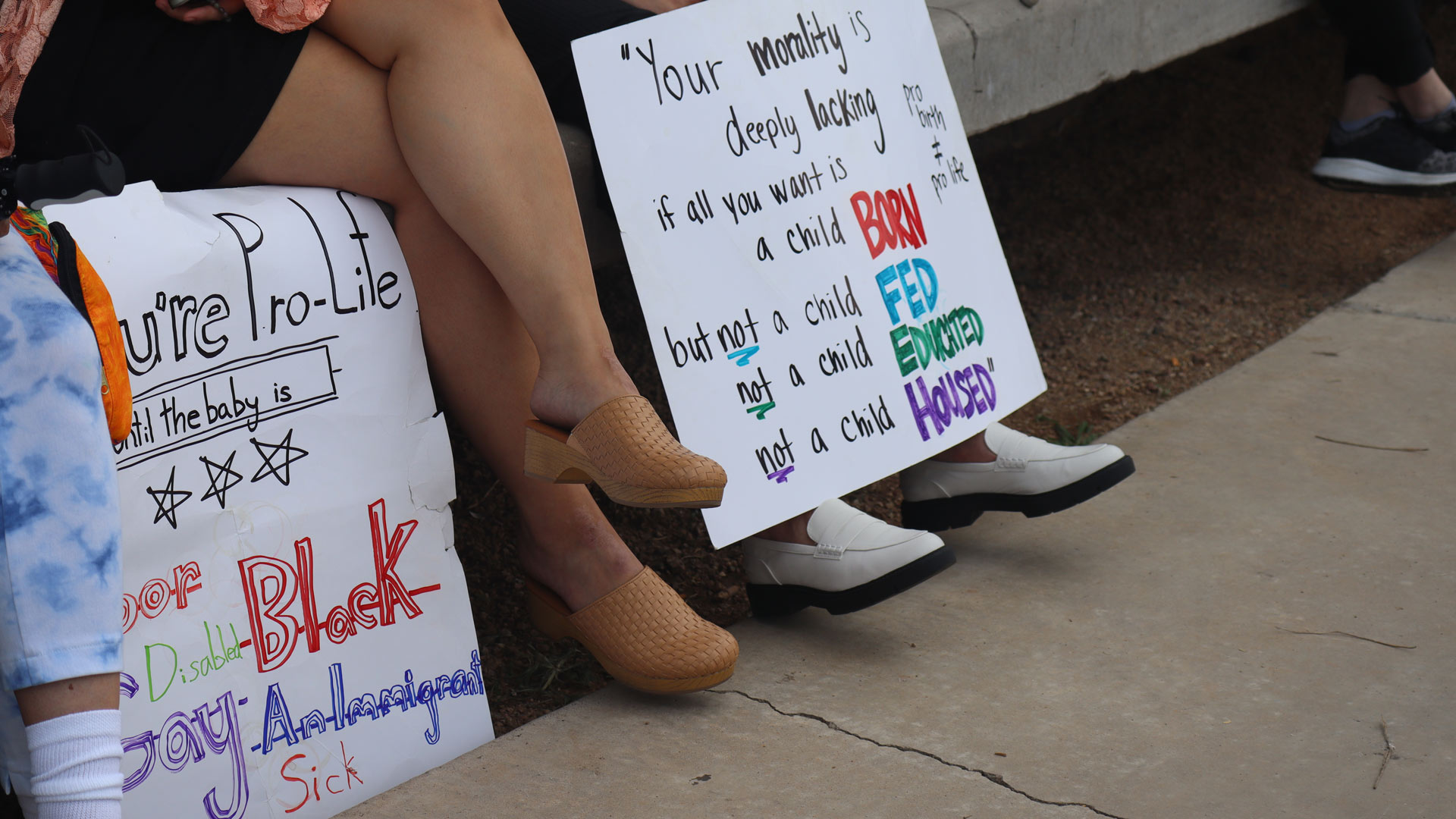 Protestors gathered at the Centennial Pavilion stage in Veteran's Memorial Park in Sierra Vista to protest the U.S. Supreme Court's decision to overturn Roe v. Wade. July 2, 2022
Protestors gathered at the Centennial Pavilion stage in Veteran's Memorial Park in Sierra Vista to protest the U.S. Supreme Court's decision to overturn Roe v. Wade. July 2, 2022
In the hours after the general election, abortion providers found it difficult to celebrate the passage of Proposition 139, the initiative that enshrines the right to abortion in Arizona’s constitution.
“I was somewhat uplifted by Prop 139 passing, but I am deeply concerned about the way the election is finalizing,” Dr. Barbara Zipkin, a Phoenix-based abortion provider, said.
Even though the proposition passed easily, Zipkin is cautious about access since results show that there will be another Donald Trump presidency.
“It's been an honor to be able to take care of people over the last bunch of years,” she said. “Now we have this man who is so unpredictable that not just my future, but my kids' futures, my grandkids' futures are all up for grabs.”
She isn’t the only one. Michele is a registered nurse at the same clinic, and her fears span more than just this state.
“I don't know if I'm thinking about the Arizonans as much as the other people in the other states,” Michele said. “Where are they going to go and how are they going to be taken care of?”
Since June 2022, access in Arizona constantly changed due to lawsuits regarding a now-repealed civil-war-era ban that only allowed exceptions for a pregnant person’s life if it is at risk.
Now, abortion access will become a right for Arizonans–something that not everyone agrees with, like Zachary Conover.
“We are, no doubt, in a very dark time,” Conover said. “We are and will enter into the bloodiest season of this holocaust yet, as far as Arizona is concerned. So, we have a lot of work in front of us.”
Conover is the communications director for End Abortion Now. He says this moment is heartbreaking and frankly doesn’t trust that a conservative presidency will bring the results he wants to see.
“I think that we live in a nation where that oath and our word have been devalued, and sometimes we don't really mean what we say, or sometimes we're just inconsistent with how we apply it.”
Now with abortion access enshrined, he says it will only galvanize his organization.
“How do we take our very good beliefs and translate that into holding the people that we elect to represent us accountable for not taking our values and representing them in the public square?”
Prop 139 is expected to officially become part of the state constitution by December this year. However, Michele says she will wait to see how things play out with Trump.
“There's still the threat of being a dependent and being able to get birth control and get things taken care of so you don't have unplanned pregnancies. Are they going to start feeding into more barriers with that?”
Likewise with Dr. Zipkin.
“You just don't know what to expect for them,” she said. “I feel terrible. I feel badly for anyone bringing children into this world. It's a really scary thought for me.”
What’s next
Since the U.S. Supreme Court overturned Roe vs. Wade, Democrats across the country have worked to protect abortion access within each state’s constitution. Proposition 139 is that for Arizonans.
Arizona for Abortion Access is the nonprofit behind Prop 139. The new constitutional amendment protects access until fetal viability, around 24 weeks gestation.
“What that will mean is for pregnant patients, they'll never have to worry about you know, ‘what are my rights today? Are they different than they were last week? Will they change again in the future?’ which is the situation we've been living under for two years here in Arizona,” Dawn Penich, the group’s communications director, said.
Currently, abortions after 15 weeks are banned in Arizona, and that legislation only has an exception to save a person’s life–not rape or incest. Because of the nature of the proposition, access will be available in cases that were not protected before.
“Because it's a constitutional amendment, that means that all existing and future laws would have to be held up against the standards set by Prop 139,” Penich said. “If it violates the tenets of this constitutional protection, then it won't be legal. It will not be able to become Arizona law.”
As for current abortion regulations in the state, like its ban on telehealth appointments for abortions, they would have to meet the amendment's standards to stay on the books, which can mean future lawsuits.
“All existing abortion regulations are eligible to be held up, brought to the courts, and Arizona judges will decide which existing laws are still workable under the constitutional foundation and which need to either be modified or be removed entirely.”

By submitting your comments, you hereby give AZPM the right to post your comments and potentially use them in any other form of media operated by this institution.